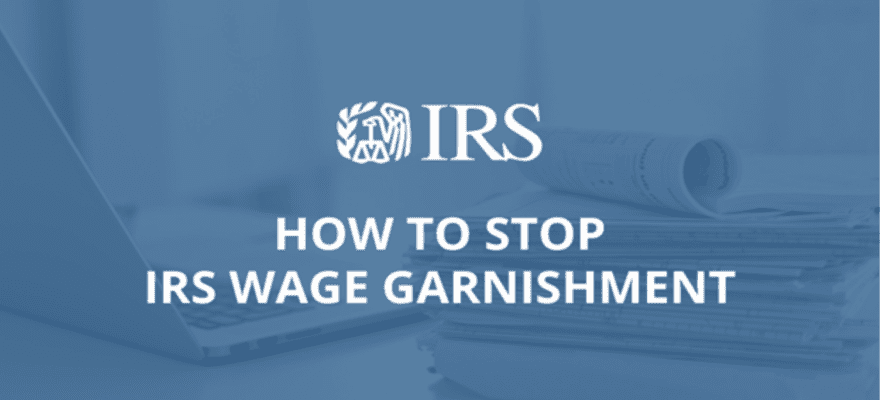When you owe money to the IRS, you’ll quickly learn that it has collection resources that outstrip any other creditor. The government has the authority to garnish your wages, salary, commissions, bonuses, and other forms of income without getting a court order first. It can also take more of your money than a regular creditor is allowed.
In general, the IRS will send you several notices before the garnishment process begins. Below is an overview of the wage levy process and what you can do to stop it.
The IRS Wage Garnishment Process
When the IRS determines that you owe a tax debt, it will send you several written notices itemizing the amount of overdue taxes, interest, and any applicable penalties. If you don’t pay the balance in full by the specified due date, the IRS will eventually send you another notice, this one titled Final Notice of Intent to Levy and Notice of Your Right to a Hearing. If you still don’t pay within 30 days after receiving this final communication, the government may proceed with garnishing your wages.
Although the law limits how much other creditors can take from your income, the IRS doesn’t face similar restrictions. The U.S. tax code simply requires it to leave you with a certain amount of income for basic living necessities. Unfortunately, this means that up to 70% of your income can be seized to satisfy a tax debt.
How To Stop IRS Wage Garnishment
To prevent or stop a wage garnishment, you need to resolve the situation with the IRS, either by paying the balance in full or entering into a mutually-acceptable repayment agreement. If you can’t afford to pay your tax bill or dispute that you owe it, below are some resolution options.
Installment Agreement
An installment agreement lets you pay the amount owed over a series of monthly payments. If you have filed all tax returns to date and owe $10,000 or less, you can qualify for a guaranteed installment agreement, which lets you pay off the debt over three years.
If you owe $50,000 or less, you may apply for a streamlined agreement that requires you to pay the debt within 72 months or before it becomes legally uncollectible, whichever comes first..
Offer In Compromise
You may be able to settle your tax debt for less than what you actually owe, but the IRS won’t automatically accept an offer in compromise. You must propose a settlement that equals or exceeds the amount that the government can reasonably hope to collect from you. You can also propose an offer in compromise when there is doubt about your tax liability or collecting the full amount would cause severe economic hardship, but these claims should only be made with help from an experienced New Jersey tax attorney.
Like an installment agreement, you can only propose an offer in compromise if you have filed all of your tax returns to date. You must also be current on your estimated tax payments.
Currently Not Collectible Status
If you can prove that wage garnishment will prevent you and your family from meeting basic needs, the IRS may suspend collection activities until your financial situation improves. Like an offer in compromise, you will have to prove financially that you qualify for this type of relief.
File a Tax Levy Appeal
When you receive the notice of intent to levy, you have 30 days to call the IRS and request an appeal. Grounds for appealing include:
- You already paid the debt in full
- There were errors in your tax assessment
- The statute of limitations for the debt has expired
- You’d like to propose alternative payment arrangements
If you disagree with the appeal results, you can contest them within 30 days. Both requesting and contesting an appeal can be complicated and should be carried out with help from an experienced tax professional.
Speak with a New Jersey Tax Debt Attorney
If the IRS has threatened to garnish your wages or a garnishment is in progress, contact Paladini Law for expert tax law assistance. Attorney Brad Paladini has years of experience in helping taxpayers address their debt to the IRS without losing a high percentage of their income. For more information, please call 201-381-4472 or complete our online form.
If you’ve recently received a Letter 1058, contact Paladini Law right away.



